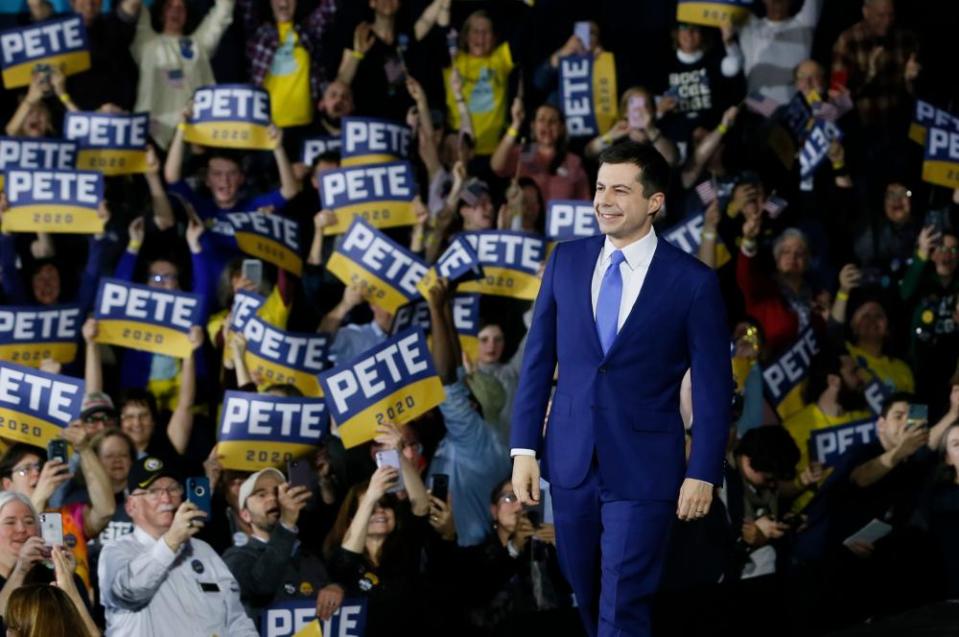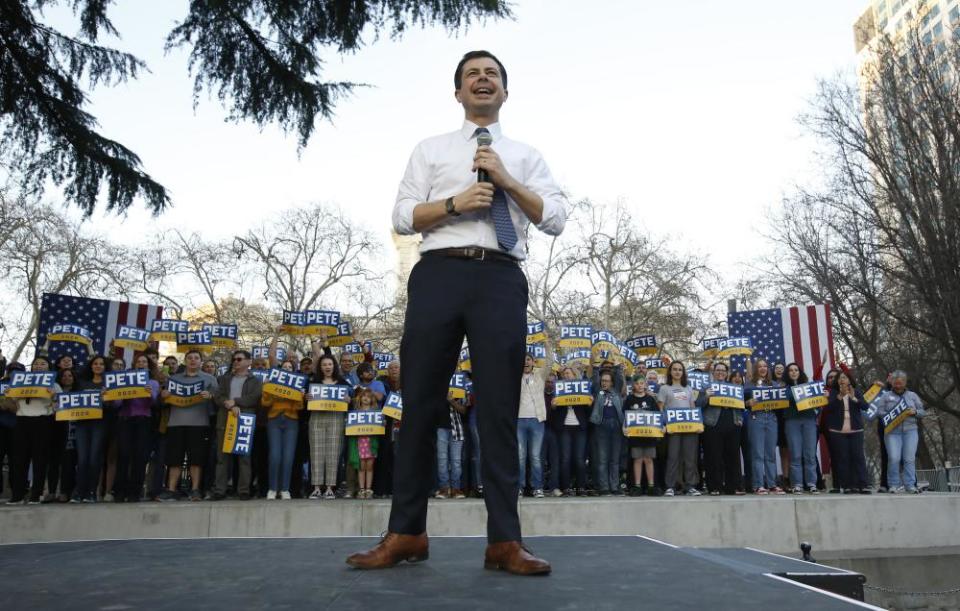'Earn it': Pete Buttigieg's plan to court communities of color

In California’s state capitol, Pete Buttigieg asked supporters to “bottle up” whatever enthusiasm propelled them to come see him and share it with family and friends. “California, I believe you can make me the next president of the United States,” he told a crowd of supporters at a town hall event on Friday night.
It was an admission – and a plea. With 494 delegates at stake in the nation’s most populous state, California acts as a gatekeeper to the general election in November.
The 38-year-old former mayor of a midsize midwestern city won the most delegates in Iowa, and the second-most votes in New Hampshire – both predominantly white states. Now, his campaign is scrambling to win over the diverse electorates in three forthcoming primary states: Nevada, South Carolina and California. So far, Buttigieg has struggled to earn the backing of voters of color.
Only 4% of black Democrats and Democratic-leaning voters supported Buttigieg in a Quinnipiac poll published on Monday. By contrast, 27% of black voters supported the former vice-president Joe Biden. Buttigieg is also polling in the low single digits among Latinos, who make up 19% of likely voters in California – with Asian Americans making up another 13%. The former South Bend, Indiana, mayor has acknowledged his struggle to court communities of color but says he’s confident the momentum he’s gained in Iowa and New Hampshire will win them over.
Related: Queer activists disrupt Pete Buttigieg event in San Francisco: 'We deserve better'
Despite Sacramento’s largely minority population, the crowd at Buttigieg’s town hall was predominantly white. So far, Buttigieg has spent much of his time in California connecting with wealthy donors in Silicon Valley and Hollywood. His courting of millionaires and billionaires, and in particular his lavish Napa wine cave fundraiser, have drawn sneers from some of his progressive competitors.
Now his campaign is reaching for more diverse crowds. Ahead of next week’s caucuses in Nevada, he’s on a whirlwind tour of the West, with Friday stops in San Francisco and Palo Alto, as well as Turlock, a Central Valley town where he is helping raise money to boost down-ballot Democrats.
This week his campaign also launched an ad in Nevada that features the polyglot Buttigieg pitching himself in Spanish as “the president who will turn the page and unify our very polarized country”.
His moderate appeal is what attracted Eileen Ikeda. “I’m looking for some who’s not extremely left or right,” she said at the Friday town hall. “That’s why he appeals to so many older people – our generation is that way.”
But Ikeda, 70, said she does worry about his lack of support among minorities and young people: “He needs to maybe put more effort and address them more.”

To that end, ahead of this visit to Sacramento, Buttigieg’s campaign added 16 full-time campaign staffers. To lead his campaign efforts in California, Buttigieg has installed Cecilia Cabello, a former official in the Los Angeles mayor Eric Garcetti’s administration and Hillary Clinton’s deputy political director in the 2016 Democratic primary. Cabello, who has close ties to organized labor in California, having worked for a carpenters’ union, could help Buttigieg access the right networks to win over the state’s electorate.
“It takes a lot of time and resources and also a lot of knowledge about California and California’s many diverse communities,” said Mindy Romero, who heads the California Civic Engagement Project at the University of Southern California. All else equal, a campaign manager with “deep knowledge of the state and connections here” can give candidates a real boost, she notes.
Buttigieg’s California operation is still much smaller than those of other candidates. And while he has by far attended more fundraisers in California than any other Democratic primary contender, Bernie Sanders – who has hired five times as many campaign staffers in the state – has held more public events.
Still, Buttigieg’s surge in national polls and his strong showing in the early primary states seemed to draw in supporters of other candidates, now willing to give him a second look. “I’m pretty invested in Elizabeth Warren,” said Jack Haskel. “But I’m also on the whoever-can-beat-Trump train. So I came to see who Pete is.”
At the town hall, West Sacramento’s mayor Christopher Cabaldon pulled questions out of a fishbowl for Buttigieg to answer. A few of them were softballs. “What is it about Chasten” – Buttigieg’s husband – “that made you fall in love with him?” Cabaldon read out. “It’s signed, ‘Chasten.’”
But Buttigieg also answered a question that political pundits and pollsters have been asking lately: how does he plan to win the African American vote? Buttigieg said he would “earn it.”
“Sometimes they talk about the black vote like it’s some guy. Let’s respect that this is not some monolithic community,” he said, before listing out a range of issues – including economic disparities, environmental justice and criminal justice reform – that he’d address as president. His credibility on the latter, in particular, has come into question as his national profile has risen.
Buttigieg has had to play down his handling of race relations in South Bend. During the debate in New Hampshire, Buttigieg equivocated when asked about the racial disparities in his city’s arrests for marijuana possession. He had also faced criticism for firing South Bend’s black police chief in 2012 after the chief recorded white officers using racist language. In June, Buttigieg had to pull himself away from his presidential campaign and return to South Bend after a fatal shooting of a black man by a white officer.

In Sacramento, where the memory hasn’t faded of two police officers killing 22-year-old Stephon Clark with impunity in his grandmother’s backyard, Buttigieg avoided addressing the issue of policing, beyond vague mentions of reducing prison populations.
It’s not only his past that Buttigieg has had to contend with. In January, the New York Times interviewed current and former campaign staffers of color who said they felt tokenized and disrespected. His tone-deaf references to the “American Heartland” and assertion that kids in “lower-income, minority neighborhoods” lack “someone who they know personally who testifies to the value of education” haven’t helped matters either.
For Sheila Gibson, a retired assistant superintendent of schools who came to the event with her daughter, Buttigieg is a good candidate despite those controversies. “You know what? He’s still white,” she said. “You can’t hold one man responsible for the system.”
While Gibson said she hasn’t decided who she’ll ultimately vote for in the primaries, she sees Buttigieg as a top contender — who can reach her community as long as he put in the effort. “He needs to visit black universities, and he needs to visit black churches — he’s got to go to where people vote,” she said. “He’s good and he’ll learn as he goes,” she said.
It helps that when he speaks, Gibson added, “he has that cadence when he speaks that Obama has”.
By the time Buttigieg had wrapped up, Anand Prakash had tears in his eyes. The 43-year-old drove more than two hours from the Bay Area to see Mayor Pete. Prakash supported Sanders in the 2016 primaries, but this time around he said Buttigieg’s ability to appeal to both the left and right won him over.
“We need someone like him,” Prakash said, showing off a selfie he’d snagged with Buttigieg. Prakash has heard the critiques that Buttigieg lacks support among younger voters and people of color. “You know, I don’t even try to convince my friends to support him,” he said. “I just say to hear him out – his message, it appeals to everyone.”

